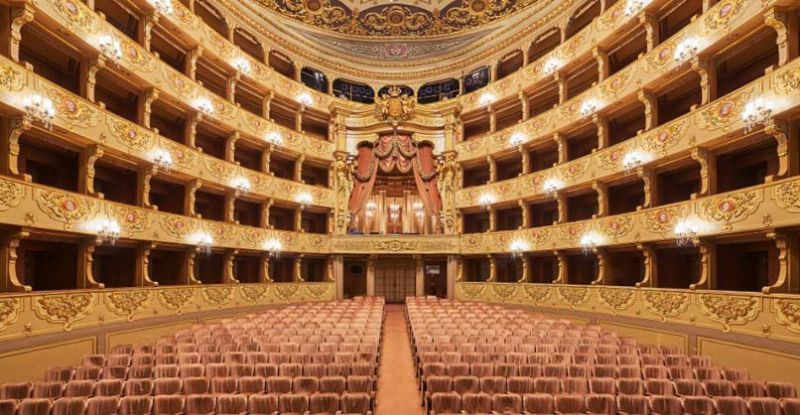Portuguese religious polyphony expanded to such an extent during the Renaissance, that the demand for opera, imported from Italy, developed quite late in Lisbon. The first performance of an Italian opera did therefore not take place before 1682. And the audience's reaction was up to par with the event: the public was so enthralled, that for the following two centuries, opera almost totally eclipsed any form of symphonic activity in the capital. In March 1755, a luxurious opera house, a reflection of Portugal's wealth, was inaugurated, only to be destroyed by the earthquake that ravaged Lisbon a few months later.
The city had to wait for several decades before discovering a new house worthy of the veritable passion that the local population vowed to the voice, a passion still strong today and that explain one of Säo Carlos' particularities: contrary to most other European opera houses, Sao Carlos was never a royal theatre, reserved for the aristocracy. In fact, six wealthy members 0f the bourgeoisie (one of them possessed the monopoly of the diamond trade with Angola and another, that of the tobacco trade) decided to finance, in 1792, the construction of a new house. The decision was made to build an edifice after the model of the most prestigious opera house at that time, the Teatro San Carlo in Naples, hence the name of Säo Carlos, which could mislead many a distracted music lover...
Seven months later, the Opera opened. The extraordinary swiftness with which the building was erected was in part due to the devotion of an energetic collaborator: the Chief of Police in person, who hired the workers and supervised the supplying of the site.
During the nineteenth century, Sao Carlos hardly distinguished itself by pre-miering works of international repute. Nonetheless, leading singers regularly came to me sure their popularity with this demanding audience, which rarely gave in to the whims of passing fads. To this day, the cast of a performance here is always prestigious, and many a record enthusiast discovered Maria Callas singing LA TRAVIATA in a recording made on the Sao Carlos stage. The theatre's current management has also made place for baroque opera in its billing, a repertoire particularly well set off by the gilded decoration that adorns this building constructed in the neoclassical style.









